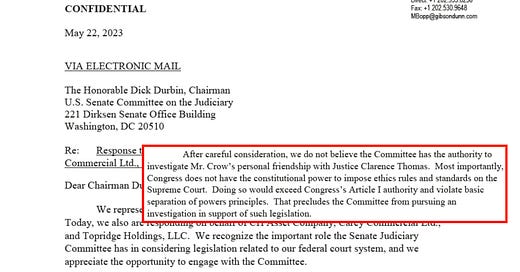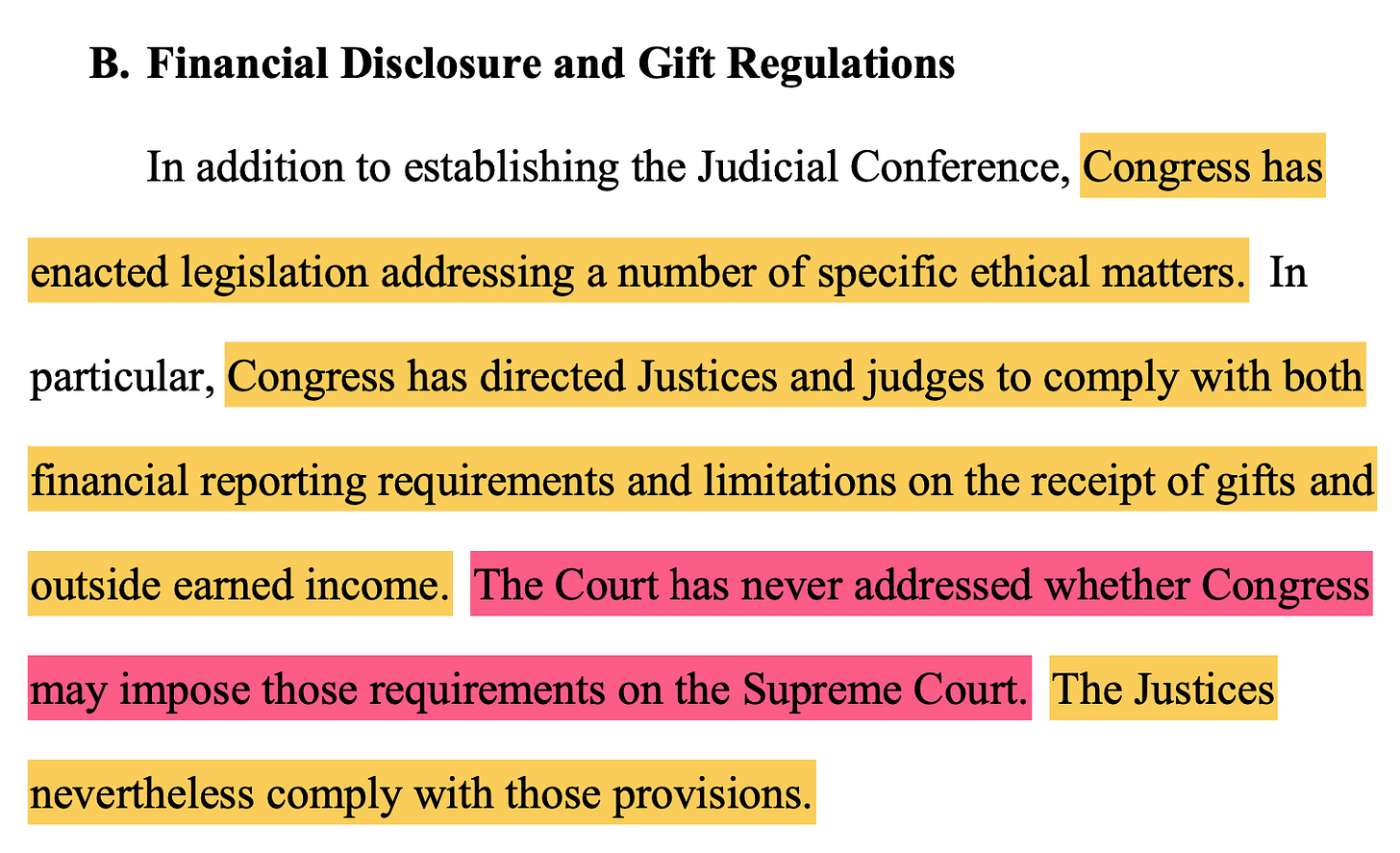Harlan Crow thinks he is the law
The billionaire and his lawyer apparently believe they get to stop congressional investigations if they so choose. Also: Hamburger Mary's sues DeSantis. And: Execution regrets.
Gibson Dunn’s Michael D. Bopp on Monday informed the Senate Judiciary Committee that Harlan Crow — the Texas billionaire who pays for vacations for Justice Clarence Thomas and builds literal statues for the justice’s former teachers — doesn’t need to respond to the request from the committee’s Democrats for information about his relationship with Thomas.
What followed in the seven-page letter — first reported by Bloomberg and uploaded as a single document by Mark Joseph Stern here — was an astounding dismissal of congressional oversight. More than that, though, it was an offensive, implicit claim that Harlan Crow is not just a billionaire, not just friends with a justice, not just influential, but is the law.
Harlan Crow — through Gibson Dunn’s Michael D. Bopp — told Senate Judiciary Committee Chair Dick Durbin that he has decided what the law is and that Durbin has no “authority” here.
What’s more, Crow — through Bopp — has decided not just what the law is but what Congress can do. (He just needs to tell us what the president can do and he’d have a three-branch trifecta!)
What is perhaps most remarkable about the letter is not even its dismissal of the congressional oversight request — which absolutely must be followed at the earliest possible moment by the committee’s issuance of a subpoena — but, rather, the underlying basis for that decision. In the letter, Bopp concludes — again, on Crow’s behalf — that “Congress lacks the authority” to pass ethics legislation relating to the Supreme Court.
Bopp cannot state that as a matter of law — and dismiss Durbin’s request based on that knowledge. This is so because Chief Justice John Roberts himself has acknowledged that Congress has already passed ethics legislation that applies to the justices. What’s more, Roberts also explained in 2011 that the court has never addressed whether Congress can do so but that the justices “nevertheless comply with those provisions.”
In other words, what this letter from Gibson Dunn’s Michael D. Bopp on behalf of Harlan Crow means is that Crow the billionaire doesn’t even care whether the Supreme Court has decided to assert that it is exempt from statutory ethics rules.
Crow has told Durbin and the nation that he — a private person — can himself decide that the Supreme Court is exempt from statutory ethics rules and then can also decide that those limits he has created absolutely bar legislation from even being considered to address the Supreme Court’s ethics and that, because of those conclusions he has made, he can ignore Durbin’s requests.
Merely stating this makes clear that this cannot be allowed to stand.
Hamburger Mary’s is coming for DeSantis
Hamburger Mary’s — a restaurant chain that hosts drag performances — filed a lawsuit in federal court on Monday challenging Florida’s S.B. 1438, the state’s new law criminalizing allowing children to attend certain drag performances. (I first saw the lawsuit via Click Orlando, which helpfully posted the complaint in its story.)
The lawsuit alleges that the new law violates the First Amendment, stating that it is “simply too vague and overbroad.” The restaurant filed a motion for a temporary restraining order and preliminary injunction along with the lawsuit.
U.S. District Judge Gregory Presnell, a Clinton appointee, has been assigned the case and issued an order Tuesday setting a hearing on the preliminary injunction request for June 6. Florida’s response to the injunction request is due by Jun 2.
Although the law is framed as barring minors from being allowed into any “adult live performance,” Republican Florida Gov. Ron DeSantis and his administration have been targeting drag performances. The Associated Press stated it as fact that the new law is aimed at drag, and the law specifically includes coverage of “prosthetic or imitation genitals or breasts” to include coverage of drag even when no actual nudity is included.
The law makes violations a first-degree misdemeanor, subjecting those who violate it to up to a year in prison.
Alabama death penalty regrets
Finally, in The Washington Post, two former Alabama governors who oversaw executions, Republican Robert Bentley and Democrat Don Siegelman, wrote an opinion column on Tuesday detailing their regrets.
As former Alabama governors, we have come over time to see the flaws in our nation’s justice system and to view the state’s death penalty laws in particular as legally and morally troubling. We both presided over executions while in office, but if we had known then what we know now about prosecutorial misconduct, we would have exercised our constitutional authority to commute death sentences to life.
The two men both oversaw eight executions as governor.
Read the whole column here.












Well, why WOULDN'T Crow think that he is the law, or at least above it? He's paid zero price for any of his influence-purchasing, and the people who are on his payroll have paid zero price as well.
Billionaires should not exist. Not as human beings, but as a category. There is nothing anyone can do to deserve that much money. Bring back the 90% tax bracket. That would still leave Mr. Crow THREE HUNDRED MILLION dollars -- enough to keep him in statues and tea sets for the rest of his life.